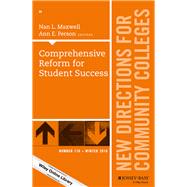This volume conceptualizes comprehensive reform as being marked by:
- a focus on student success;
- a theory of change that ties programmatic components together in an intentional and cohesive package, implemented at multiple levels throughout the college and touching the majority of students; and
- a culture of evidence that uses data to continuously assess programs and processes against student success.
This is the 176th volume of this Jossey-Bass quarterly report series. Essential to the professional libraries of presidents, vice presidents, deans, and other leaders in today's open-door institutions, New Directions for Community Colleges provides expert guidance in meeting the challenges of their distinctive and expanding educational mission.









